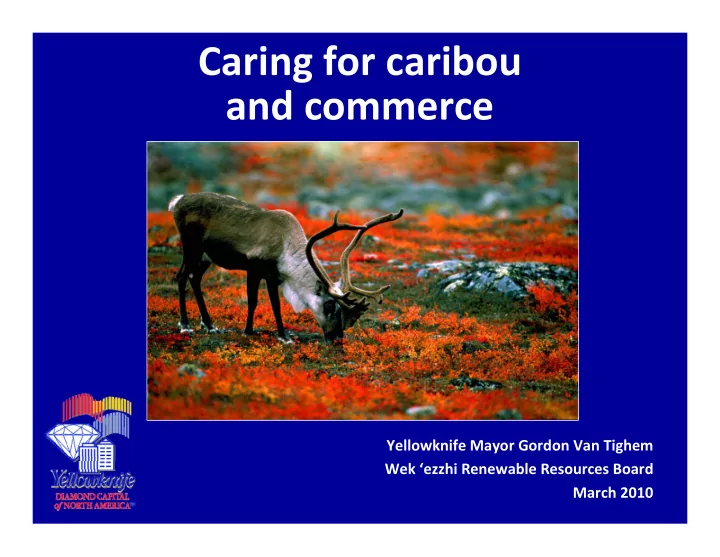

Caring for caribou and commerce Yellowknife Mayor Gordon Van Tighem Wek ‘ezzhi Renewable Resources Board March 2010
Outline • Economic overview ‐ City • GNWT ‐ ENR says • Joint proposal recommendations for recovery • Economic impact barren ‐ ground caribou outfitters • Bottom line for business • Biggest losers…besides the caribou • Outfitting the future • Recommendations
Economic overview ‐ city � NWT centre of government, transportation and communications, with extensive support services. � Gateway to vast resources in the NWT and Kitikmeot region in Nunavut. � Northern cultural and arts headquarters, with superior recreational and sport options. � Home to several businesses with close links to sport hunting industry.
GNWT ‐ ENR says… • ENR data ‐ Bathurst herd total estimated at 31,900 (+/ ‐ 10,900) in 2009 compared to 128,047 (+/ ‐ 27,343) in 2006. • Bluenose East Herd and Ahiak Herd also appear to be declining.
Joint proposal recommendations for recovery • Eliminate all commercial meat tags. • Eliminate outfitter industry. • Eliminate resident hunting. • Eliminate female harvest within Bathurst herd. • Restricted bull harvest only and hunt among other herds.
Economic impact: barren ‐ ground caribou outfitters 2006 study by Ellis Consulting Services outlined the economic impact of the NWT Barren ‐ Ground Caribou Outfitters: • From 1999 ‐ 2005, outfitter revenues were $27.8 million. Expenditures in the same period totalled $20.7 million. • From 1999 ‐ 2005, non ‐ resident hunters spent $8 million on purchasing goods and services in the NWT. • The outfitting industry contributed $28.2 million to the NWT GDP from 1999 ‐ 2005.
Economic impact: barren ‐ ground caribou outfitters • From 1999 ‐ 2005, outfitting industry contributed $10.9 million in labour income – NWT. • 2.2 thousand seasonal jobs in the NWT were generated by outfitter industry from 1999 ‐ 2005. • During 1999 ‐ 2005, outfitter industry generated $648,000 in taxes for local governments; $1.7million in taxes for GNWT; $3 million for federal government.
Bottom line for business • Wolverine Guns and Tackle closes after 22 years in business. Sport hunters provided major revenue. • Weaver and Devore losing business as supply line to caribou outfitters cut off. • Layoffs in taxidermy business. • Less revenue for charter aircraft, service and accommodation sectors. • Loss of discretionary spending by caribou sport hunters will negatively impact the incomes of aboriginal and local artisans.
Biggest losers… besides the caribou • NWT barrenground outfitting industry faces uncertain future, regardless of the final caribou management plans. • Hunting restrictions recommended for the next few years will adversely affect traditional lifestyles and labour supply and retention. • Caribou outfitters cannot afford to wait to know if their business will be viable in three to five years. Other jurisdictions have provided extensive support to industries facing hardship (ie: 70 per cent tax reduction for forestry).
Outfitting the future • GNWT announced the Caribou Outfitter Marketing Program at the end of 2009 to help outfitters develop/market new product. • GNWT needs to seriously consider allocating more financial resources to help established outfitters diversify their businesses and market or develop new product. • Demise of caribou outfitting industry will not only have financial implications for Yellowknife and NWT businesses, it will mean tremendous loss of expertise in the tourism industry. • Outfitters have spent decades developing their product and building their client base – neither of which can be easily replaced.
Recommendations • GNWT report outlining immediate and future impacts caribou management/recovery plans will have on herds, hunters, residents, outfitters, business/mining industry would benefit everyone. • A stronger and earlier commitment to annual census programs and review of possible quotas. • Detailed analysis of product diversification options for existing caribou outfitters and available financial assistance to develop/market product. • Consultation with impacted populations – including City of Yellowknife.
Recommend
More recommend